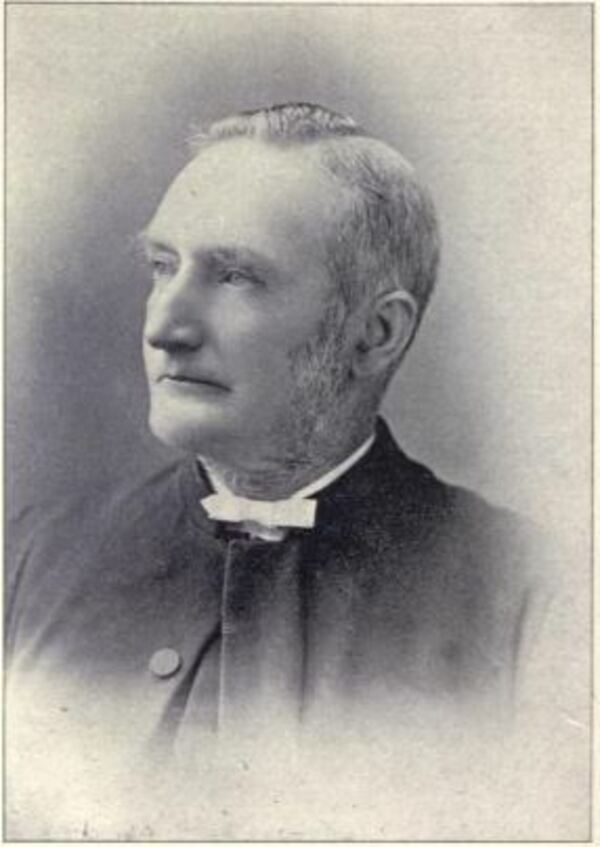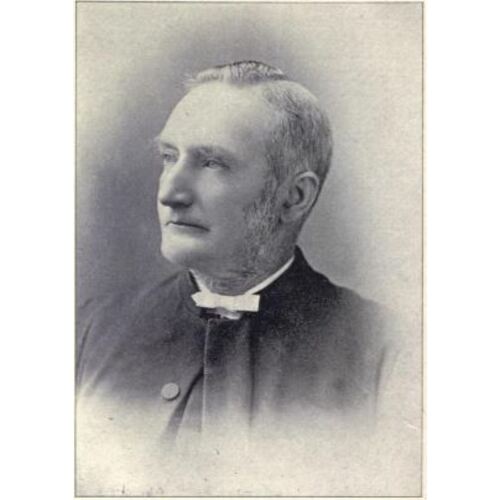
Source: Link
LATHERN, JOHN, Methodist minister, author, editor, and journalist; b. 31 July 1831 in Newshiel, near Alston, Cumberland, England, son of John Lathern and Hannah Walton; m. 20 July 1859 Mary Elizabeth Simpson (d. 1909) in Fredericton, and they had two daughters and one son; d. 8 Jan. 1905 in Halifax.
John Lathern was born in a mining district near the Cumberland-Northumberland border. His father, who was descended from an old Northumberland family, was manager and part-proprietor of a lead mine. Mining communities in the north of England had been strongly influenced by Methodism in the 18th and early 19th centuries, and the Latherns had been among those converted. John received an educational upbringing that was both pietistic and sound, in accordance with his family’s religious convictions and social standing. The family business dictated that he be trained as a mining engineer. He soon realized, however, that he felt drawn to the Methodist ministry, and by 1855 he had joined the British Wesleyan Conference as a probationer. He approached the Wesleyan Methodist Missionary Society with the idea of serving in Africa, but he was assigned to eastern British North America.
Following four years as a preacher at Fredericton, Cornwallis Township, N.S., and Saint John, N.B., Lathern was ordained and received into the Wesleyan Methodist Conference of Eastern British America in 1859. That same year he married the eldest daughter of New Brunswick’s queen’s printer. The marriage provided Lathern with a special reason for a long-term commitment to the Maritimes, in effect changing him from missionary to immigrant.
Lathern’s duties over the years took him back to Fredericton and Saint John as well as to congregations in Halifax, Yarmouth, Windsor, Amherst, and Dartmouth in Nova Scotia. His pastoral career was marked by general success and appreciation of an apparent gift for preaching and public lectures. Eulogies and circuit news reports stressed his eloquence and learned style. Lathern’s ministerial popularity rested ultimately, however, on his religious and moral zeal, devotion to Methodist teaching, and amity towards other Protestant churches which embraced evangelical principles. In 1905 the Baptist minister and historian Edward Manning Saunders* recalled how he and Lathern had cooperated during a religious revival in Kings County, N.S., in the winter of 1858–59. It was that ecumenical openness which later in life induced Lathern to become a member of the non-denominational Evangelical Alliance of Halifax and serve a term as its president.
Early in his career Lathern began to involve himself in the administration of the church. He functioned as financial secretary of his conference (1865–66, 1870–72) and as a delegate to the first general conference of the Methodist Church of Canada (1874). His abilities were recognized in 1881 by his election as president of the Nova Scotia conference, which also sent him as its representative to five general conferences up to 1894. Lathers was a delegate to the Methodists’ Ecumenical Conference in Washington (1890) and a spokesman for Canadian Methodism at the Methodist Episcopal Church’s quadrennial session in Cleveland, Ohio (1896). Lathern also played an important role as a member of the hymn-book committee of the Methodist Church of Canada in 1884; his proposals with regard to its thematic structure and the hymns to be included were in large part adopted by the committee.
Between 1886 and 1893 Lathers was editor of the newspaper of the eastern Canadian districts, the Wesleyan. Under him, the paper continued to link the congregations of the region through regular circuit reports, news from the British Wesleyan Conference, and information on the progress of Methodism around the world. His inclusion of moralizing serial stories, biographies of early Wesleyans, general literary items, and historical articles reflected his own keen interest in education.
This interest also ensured that Lathern would be concerned with the aims and government of Mount Allison Wesleyan College at Sackville, N.B. For several years he served on the board of governors for the college, which in 1883 awarded him an honorary dd. Lathern was convinced that Mount Allison was the only institution of higher education that eastern Canadian Methodists should attend, and he opposed Josiah Wood* and other proponents of a single Methodist college in Toronto. He also involved himself in building campaigns and the expansion of the campus. Lathern’s commitment was reinforced when his daughter Laura Alicia joined the teaching staff of the Mount Allison ladies’ college.
In addition to his editorials and other contributions for the Wesleyan, Lathern was the author of pamphlets and books on a variety of religious and secular topics, including a biography of Lemuel Allan Wilmot*, a prominent Methodist judge and politician of New Brunswick. His writings invariably included moralizing observations, and in his treatment of historical subjects he gave whole-hearted support to British imperialism as an agency for the spread of Western technology, law, and social norms as well as of evangelical Protestantism. At the same time he displayed a special pride in the contributions of Maritimers to the empire.
John Lathern in his several roles imbued a wide audience in eastern Canada with the values of Protestant evangelical piety. He also advocated an emphasis on morality, obedience to the law, and increased concern for social issues such as temperance and education. He showed by his own career, moreover, that spiritual vitality was not inimical to modern education. In his admiration for the British empire Lathern reflected a belief prevalent in English-speaking Canada that as the oldest dominion the country had a special role in that institution.
A photograph of John Lathern appears in the Canadian album (Cochrane and Hopkins), 3: 78.
In addition to his editorials and other contributions to the Wesleyan (Halifax), Lathern’s works include: Havelock’s last campaign: a lecture . . . (Halifax, 1865); Cromwell, Cobden, Havelock, and the English reformers (Saint John, N.B., 1871); Baptisma: a three-fold testimony; water-baptism, spirit-baptism, and the baptism of fire (Charlottetown, 1877; 2nd ed., Halifax, [1878]; a third edition appeared under the title Baptisma: the mode and subjects of Christian baptism (Halifax, 1879)); Honorable Judge Wilmot, a biographical sketch (Halifax, 1880); “The inspiration of the Bible: a lecture,” Mount Allison Wesleyan College, Theological Union, Third annual lecture and sermon, delivered June, 1881 (Halifax, 1881); and The Macedonian cry: a voice from the lands of Brahma and Buddha, Africa and isles of the sea, and a plea for missions (Toronto, 1884). References to these publications appear in Canadiana, 1867–1900, the CIHM Reg., and R. E. Watters, A checklist of Canadian literature and background materials, 1628–1960 . . . (2nd ed., Toronto and Buffalo, N.Y., 1972).
UCC, Maritime Conference Arch. (Halifax), B99 (biog. sketches, family and individual), box 63, envelope 147 (re John Lathern – hymn-book). Novascotian, 13 Jan. 1905. Provincial Wesleyan (Halifax), 19 July, 2 Aug. 1855. Wesleyan, 7 Jan., 9–23 Dec. 1886; 9 Jan., 17 Feb., 10 March 1887; 11–18 Jan. 1905. Canadian men and women of the time (Morgan; 1898). Cornish, Cyclopædia of Methodism. D. W. Johnson, History of Methodism in Eastern British America . . . ([Sackville, N.B.], n.d.). A new historical geography of England, ed. H. C. Darby (Cambridge, Eng., 1973). Reid, Mount Allison, vol.1 . T. W. Smith, History of the Methodist Church within the territories embraced in the late conference of Eastern British America . . . (2v., Halifax, 1877–90).
Cite This Article
Allen B. Robertson, “LATHERN, JOHN,” in Dictionary of Canadian Biography, vol. 13, University of Toronto/Université Laval, 2003–, accessed February 21, 2026, https://www.biographi.ca/en/bio/lathern_john_13E.html.
The citation above shows the format for footnotes and endnotes according to the Chicago manual of style (16th edition). Information to be used in other citation formats:
| Permalink: | https://www.biographi.ca/en/bio/lathern_john_13E.html |
| Author of Article: | Allen B. Robertson |
| Title of Article: | LATHERN, JOHN |
| Publication Name: | Dictionary of Canadian Biography, vol. 13 |
| Publisher: | University of Toronto/Université Laval |
| Year of publication: | 1994 |
| Year of revision: | 1994 |
| Access Date: | February 21, 2026 |



